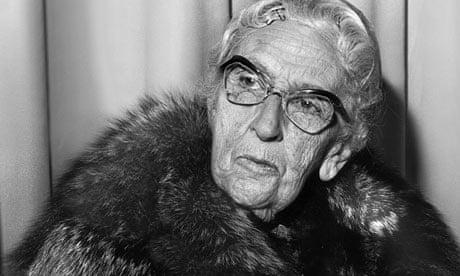An in-depth analysis of Agatha Christie's novels has suggested that the much-loved author of more than 80 mysteries was suffering from Alzheimer's disease.
Academics at the University of Toronto studied a selection of Christie's novels written between the ages of 28 and 82, counting the numbers of different words, indefinite nouns and phrases used in each.
They found that the vocabulary size of the creator of Poirot and Miss Marple decreased sharply as she neared the end of her life, by 15 to 30%, while repetition of phrases and indefinite word usage (something, thing, anything) in her novels increased significantly.
"We found statistically significant drops in vocabulary, and increases in repeated phrases and indefinite nouns in 15 detective novels from The Mysterious Affair at Styles to Postern of Fate," said the academics, Dr Ian Lancashire from the English department and computer scientist Dr Graeme Hirst. "These language effects are recognised as symptoms of memory difficulties associated with Alzheimer's disease."
The most abrupt decline was seen in a novel Christie wrote aged 81, Elephants Can Remember. The book showed, they said, 30% fewer word types than Destination Unknown, which she wrote aged 63, 18% more repeated phrases, and almost three times as many indefinite words.
Lancashire told Canadian current affairs magazine Macleans that the title of the novel, a tweaking of the proverb "elephants never forget", also gives a clue that Christie was defensive about her declining mental powers, while the protagonist is unable to solve the mystery herself, and is forced to call on the aid of Hercule Poirot.
"It reveals an author responding to something she feels is happening but cannot do anything about," he said. "It's almost as if the crime is not the double-murder-suicide, the crime is dementia."
Although Christie, whose books have sold over two billion copies worldwide, was never diagnosed with dementia, the authors of the study conclude that the changes in her writing are consistent not with normal ageing, but with Alzheimer's disease. "These signs, especially indefinite word usage, are present in her writing from her early 70s," they said.
The Canadian study supports a 2004 comparison of two early works by Iris Murdoch with her last novel, Jackson's Dilemma, which concluded that textual analysis could be used to detect the onset of dementia before anyone [has] the remotest suspicion of any untoward intellectual decline".
Jackson's Dilemma was published in 1995 to a poor critical reception, and Murdoch was found to have Alzheimer's the following year. Scientists from the Institute of Cognitive Neuroscience at University College London compared it to earlier works Under the Net and The Sea, The Sea, and found that her vocabulary had worsened in the final work, which contained fewer words and clauses per sentence on average.
Lancashire and Hirst are now continuing and extending their study, looking into changes in Christie's use of passive verbs and the decline in her syntactic complexity. They also want to compare her writing with the work of a contemporary for whom dementia is not suspected. HG Wells, who wrote prolifically with no signs of mental degeneration up until his death, was one suggestion.

Comments (…)
Sign in or create your Guardian account to join the discussion